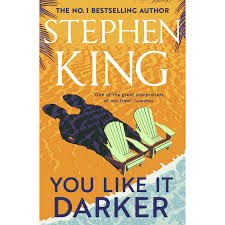Title: You Like It Darker
Author: Stephen King
Publisher: Hodder & Stoughton/Hachette, 2024; RRP: $34.99
In the afterword to this, his latest collection, Stephen King writes that the reader of horror stories needs to be empathetic. Research has revealed that reading fiction more generally assists the development of empathy, and certainly King appears to be on the mark: how else do you appreciate a horror story if you don’t feel for the predicament of the characters who are facing the worst moments of their lives?
The collection contains 12 stories, varying in length and subject matter, but most, yes, veering to the dark side, with themes of death (whether murder, illness and age, misadventure) and loss prevalent.
The opener, ‘Two Talented Bastids’, is a surprise: not so much a horror story but quickly revealed to be more in the camp of science fiction. It also ruminates on the nature of creativity, something King touches on again in his Afterword. Interestingly, he writes a little of the process, how he often doesn’t know the ending of his stories, which may explain some of the novels – and indeed, some of the stories here – that end less than convincingly.
On the shorter side are stories such as ‘The Fifth Step’ and ‘Willie the Weirdo’, which punch quickly and take their leave. As noted elsewhere, ‘Willie’ is notable for exploring familiar ground, and if there is a criticism of this collection, it may be the absence of wow factor of significant overturning of reader expectation.
‘Laurie’ is another deviation from the darker theme, reminiscent of the gorgeous ‘The Last Rung on the Ladder’, from Night Shift, about kids and hay and death, which along with the faintly absurd ‘The Mangler’ have stuck with me since that first reading. Here, too, death, but this is a story of loss and grief, not things going bump in the night. It’s another reminder that while King is perhaps best known for his horror stories, his mastery is by no means confined to genre.
Stephen King reads from ‘You Like It Darker’
@ Simon and Schuster
In ‘Danny Coughlin’s Bad Dream’, one of the longer pieces, the supernatural element is restricted (kind of) to a prophetic dream, one that lands Danny in hot water. King acknowledges the nod to Les Miserable as a cop obsesses over Danny’s brush with a murder, with the damage done by unsubstantiated accusations a key part of the story.
Arguably the centrepiece of the collection is ‘Rattlesnakes’, a ‘where are they now’ story following on from the novel Cujo and also giving a nod to Duma Key. There’s a spooky little pram in this that will likely linger long after the cover has been closed, every bit as effective as some of the spookier aspects of The Shining.
What the collection reminds us, regardless of whether the story is but a simple idea of a few pages or a full novella, is King’s capacity to succinctly and effectively evoke character – that empathy, kicking in. Characters face pivotal moments in their lives, and King deftly invites us into their world and encourages us to walk in their shoes.
Another characteristic of King’s stories, especially here, is that characters are not special in terms of being equipped to face the challenges presented to them. As such, they are eminently approachable. A case in point is ‘The Answer Man’, the closing story and the least effective for me, being essentially a precis of the life of Phil Parker, who gets the chance to get a peek into the future. Will we be happy, he asks the Answer Man, who replies, sure, but there will be ups and downs. Which is life, really, and also this collection: as with any such assortment, different stories will strike chords with different readers, but there is diversity enough here for everyone to find a favourite.
Reviewed by: Jason Nahrung
Ballarat Writers Inc. Book Review Group
Review copy provided by the publisher

Leave a Reply